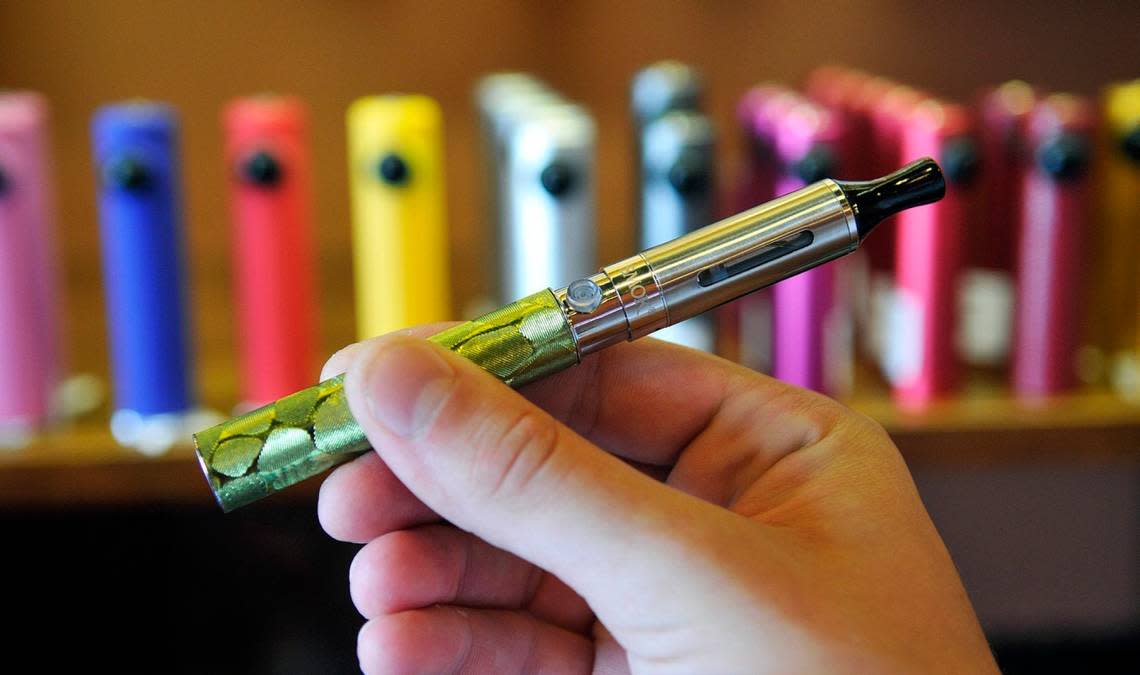NC set to ban most vaping products. Would it protect kids or big tobacco?

Hundreds of e-cigarette products are likely be banned in North Carolina under new rules overwhelmingly approved by state lawmakers.
The General Assembly gave its final approval Wednesday to legislation creating a vaping registry that only allows federally authorized vaping products to be sold in North Carolina. If Gov. Roy Cooper agrees, it would make most vaping products illegal because few have been authorized by the U.S. Food and Drug Administration.
“The language contained in this bill will provide the much-needed accountability, enforcement and transparency to what is a dangerous and unmanageable situation that we have going on right now,” said Rep. Erin Paré, a Wake County Republican who was the primary sponsor of the original bill.
The vaping industry has called the bill an attempt to protect traditional tobacco companies.
“The North Carolina State legislature is being pushed by combustible cigarette companies to create a vapor products ‘directory,’ which will import an illegal FDA process into North Carolina,” according to a post from the Vapor Technology Association. “These companies are trying to turn the state into the police force for the FDA and the Administration and remove virtually all vapor products from the shelves — propping up cigarettes and hurting public health.”
Vaping bill also helps Wake County schools
The vaping language was tacked on last week by the Senate to a bill that allows the Wake County school system’s two leadership academies to retain their state designation as early college high schools. Wake is ending its relationship with St. Augustine’s University to find a new college partner for the schools.
Paré said the Wake County schools portion of the bill is not controversial and that passage of that provision is time sensitive.
House Bill 900 was unanimously approved last week in the Senate. The House passed it Wednesday in a 98-16 vote.
Vaping ‘epidemic’
E-cigarettes are electronic devices that use a liquid laced with nicotine, producing a vapor which users inhale. Their popularity caused the FDA to declare an “epidemic” of underage vaping among young people.
“I have a junior in high school and a freshman in high school, and I’m very concerned about this issue as I’m sure you are as well,” Paré said during the floor debate. “The vaping that’s happening in school bathrooms, on school buses on a wide scale is dangerous, and it’s been very hard to control and manage for parents, school administrators, SROs, etc.”
The state and multiple North Carolina school districts have successfully joined federal class-action lawsuits against e-cigarette makers, like Juul.
North Carolina won $47.8 million in a settlement with Juul. North Carolina was the first state to challenge and force change in how Juul targets teens with its marketing.
The concerns about vaping are why eight other states already have a similar vaping registry, according to Paré.
Vaping directory would be created
Under North Carolina’s legislation, manufacturers would need to be certified by the state Department of Revenue to have products put on a directory of eligible vaping products.
Certification requirements would include having submitted an accepted application for vape products to the FDA by Sept. 9, 2020. Eligible products must also have been marketed in the United States as of Aug. 8, 2016.
The new directory won’t become effective before March 1, 2025. Retailers would have a 60-day grace period from that point to get rid of any products that are not listed.
Stores caught selling products not on the registry would face fines and loss of their business license.
Last week, a representative from the Vapor Technology Association told lawmakers the bill would cause 2,095 vaping jobs to disappear and would lead to a loss of $447.4 million from the state economy.
Rep. Sarah Crawford, a Wake County Democrat, said she hopes that they can make adjustments before the directory goes live next year.
“I do acknowledge that there are some challenges with some of the language,” said Crawford, one of the sponsors of the original bill. “It’s not perfect. There was an effort to get this done quickly because it is such a problem in the state of North Carolina.”
Under the Dome
Get the latest news about North Carolina politics from The News & Observer's award-winning team. Get the free digest sent to your inbox by signing up here.

